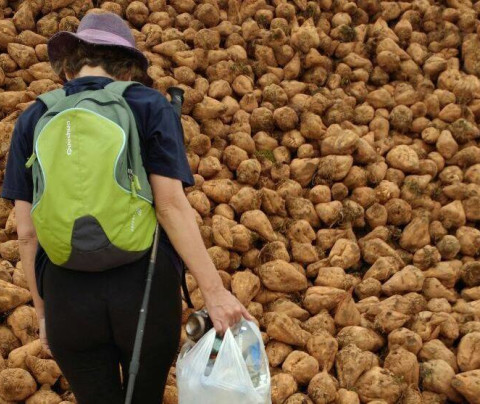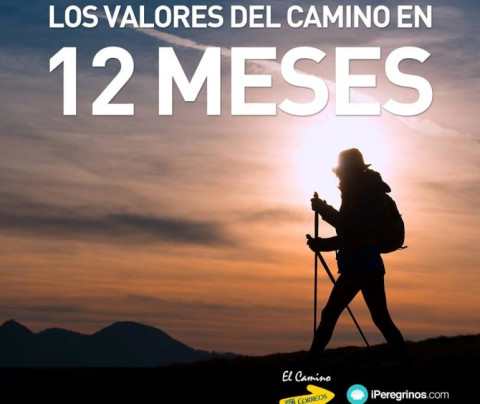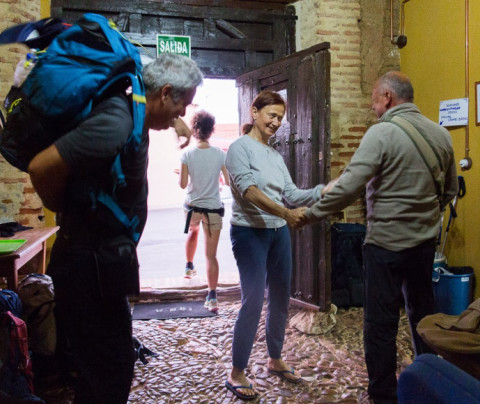The values of the Camino in 12 months
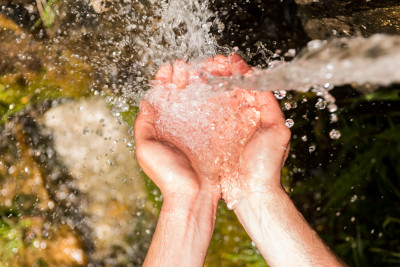
We continue with our initiative Values of the Camino in 12 Months, dedicating this month of June to Sustainability on the Camino de Santiago. Strength, Peace, Sensibility and Solidarity have been the previous 4 values to which we dedicated a month, telling particular stories here on blog and sharing them on Facebook, Twitter and Instagram for the Camino Post Office.
Sustainability is a very present value among pilgrims. The Camino is a trip of connection with nature and protecting it is indispensable in connecting with it. And without nature there is no Camino, which is why sustainability must be a priority for all pilgrims, hospitality workers and other workers who are dedicated to services on the Camino de Santiago.
We have wanted to match our month dedicated to Sustainability with World Environment Day, celebrated on 5 June, since we didn't want to limit this to one day, even though this is a short month. The Camino Post Office's objective is that we think about the environmental footprint we leave at every step on the Camino, by both pilgrims and workers.
Sustainability Initiatives on the Camino
Closely related to the reduction of environmental impact, the Life Stars project was born, which will culminate this September, after almost 4 years in which the Federation of Association of Friends of the Camino de Santiago and the San Valero Centre, with the collaboration of the Austrian Environmental Ministry and Europe Innovation and Development have succeeded in demonstrating that it is possible to reduce energy consumption and greenhouse gas emissions.
The way to achieve this is based on small gestures, which can mean big changes like reducing water consumption and emission of gasses, achieving an increase in energy savings. To this end, they have created a Decalogue of Good Environmental Practices:
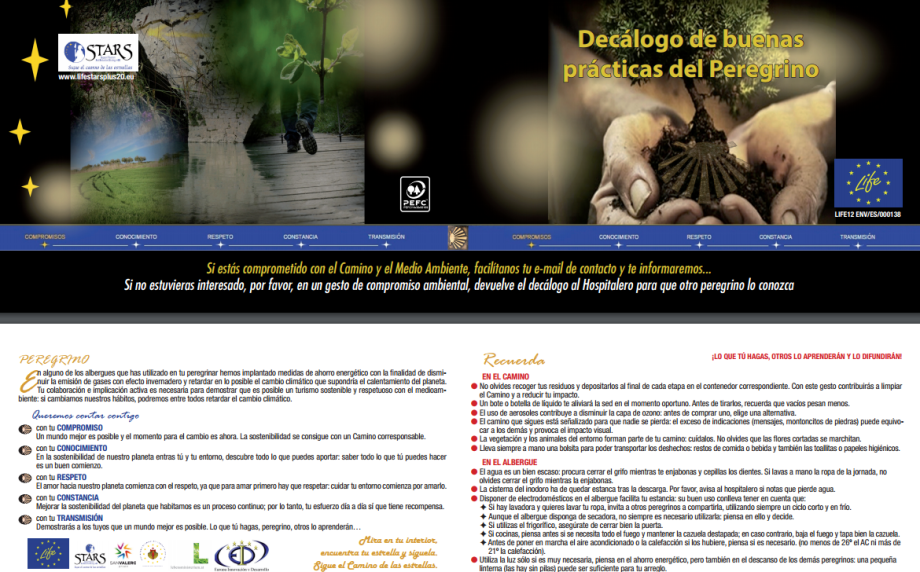
This decalogue is divided into 10 actions and 5 attitudes that must be assumed to become committed to the environment, appealing to change in habits to delay climate change as much as possible.
Commitment, knowledge, respect, constancy and transmission are the five keys to compliance with the Decalogue of good practices. The commitment is necessary to maintain the responsibility of each with Sustainability; knowledge is necessary to know the contribution of each.
The first step is to know what can be done; respect is beautiful and is the first step to loving the planet, and love is the previous step in caring for it, according to the manifesto. They continue with constancy, since the improvement of sustainability is a continuous effort and, finally, transmission to show more people how to collaborate in having a more sustainable Camino de Santiago and world.
Below is the decalogue that this project has created so that life on the Camino de Santiago is more sustainable and that our footprint is reduced to our stride on the Camino.
● Don't forget to collect your waste and deposit it at the end of each stage in the corresponding container. In this way, you're contributing to cleaning the Camino and reducing your impact.
● A bottle of liquid will relieve your thirst at the right time. Before throwing it away, remember that an empty bottle weighs less.
● The use of aerosols contributes to the reduction of the ozone layer: before buying, choose an alternative.
● The Camino that you follow is marked so that no one is lost: excessive indications (messages, stones) can confuse others and cause visual impact.
● Surrounding vegetation and animals are part of your Camino: don't forget that cut flowers wither.
● Always carry a small bag for waste: food or drink remains and also wipes or toilet paper. AT THE HOSTEL
● Water is a scarce commodity: try turning off the tap while you soap up or brush your teeth. If you wash your day clothes by hand, don't forget to turn off the tap while soaping up.
● The toilet must be sealed after discharge. Please, tell the hostel worker if you lose water.
● Having appliances at the hostel facilitates your stay: good use entails taking into account:
✦ If there is a washing machine, invite other pilgrims to share it, always use a short and cold cycle.
✦ Even though the hostel has a dryer, it is not always necessary to use it: think about it then decide.
✦ If you use the refrigerator, make sure you tightly close the door.
✦ If you cook, think beforehand if you need all the fire and keep the pan uncovered; otherwise, lower the heat and cover the pan well.
✦ Before putting on the air conditioner or the heat, think if it is necessary. (no less than 26º for the AC and not more than 21º for the heating).
● Use the light only if it is very necessary, think about saving energy, but also the rest of your fellow pilgrims: a small flashlight (without batteries) may be enough.
International Symposium on Hospitality and Environmental Management
From all this, our Camino colleagues from the Federation of Associations of Amigos of the Camino de Santiago talked to us at the International Symposium of Hospitality and Environmental Management, where we also presented the positive results of this project, in which in less than 4 years we have been able to demonstrate an increase in efficiency and sustainability in five hostels on the Camino Francés in Spain: Arrés in Aragón; Zabaldika in Navarra, Nájera in La Rioja, Ponferrada in Castilla and León, Samos in Galicia and one more in Austria, reducing water consumption by 20% in these hostels, increasing energy savings by 25% and reducing the emission of greenhouse gases.
From here, we hope to help sustainability on the Camino de Santiago by making known to all our pilgrims our margin of improvement and realizing that it is possible to have a Camino that treats nature well, so that we cannot connect with it 100%, thus achieving a magnificent experience and helping to preserve what we have so that many more people can continue to enjoy it for a long time.
Safe travels!!
Your email address will not be published.
Mandatory fields are marked with *




